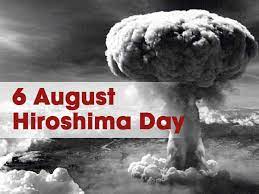On August 6, 1945, the world witnessed a catastrophic event that forever changed the course of history - the dropping of an atomic bomb on Hiroshima, Japan. This tragic event, carried out by the United States during World War II, resulted in unimaginable destruction, loss of life, and long-lasting consequences. This date serves as a somber reminder of the immense human suffering caused by the use of nuclear weapons. The Bombing of Hiroshima: At 8:15 a.m. local time, the Enola Gay, a U.S. B-29 bomber, dropped the "Little Boy" atomic bomb on Hiroshima. The bomb exploded approximately 1,900 feet above the city, instantly releasing an immense amount of energy in the form of an intense blast, heat, and radiation waves. The impact was catastrophic, obliterating buildings, causing widespread fires, and inflicting unimaginable devastation on the city and its inhabitants. Immediate and Long-Term Casualties: The immediate death toll in Hiroshima was estimated to be around 70,000, with tens of thousands more suffering severe injuries. Many of those who survived the initial blast succumbed to radiation sickness in the days, weeks, and years that followed. The long-term effects of radiation exposure included increased rates of cancer, birth defects, and other health complications for survivors and subsequent generations. Human Tragedy and Destruction: Hiroshima, once a thriving city with a population of approximately 350,000, was reduced to ruins within seconds. Homes, businesses, and infrastructure were completely destroyed, leaving countless survivors homeless and without basic necessities. The bombing caused immense psychological trauma, as survivors grappled with the loss of loved ones, physical injuries, and the haunting memories of the event. Global Impact and Nuclear Disarmament: The bombing of Hiroshima had far-reaching consequences that extended beyond Japan. It marked the beginning of the nuclear age and raised profound ethical questions about the use of such devastating weapons. The event served as a catalyst for discussions on nuclear disarmament and the prevention of future nuclear catastrophes, leading to the establishment of treaties and organizations dedicated to non-proliferation efforts. The Importance of Remembering: Remembering the tragic events of August 6, 1945, is crucial for honoring the victims, acknowledging the human cost of war, and emphasizing the importance of peace. It serves as a reminder of the devastating power of nuclear weapons and the urgent need for global cooperation to prevent their use in the future. By remembering Hiroshima, we strive to ensure that such a catastrophic event is never repeated. Rebuilding and Peaceful Resilience: In the aftermath of the bombing, Hiroshima embarked on a remarkable journey of rebuilding and resilience. The city's remarkable recovery serves as a testament to the strength and determination of its people. Today, Hiroshima stands as a symbol of peace and reconciliation, with the Hiroshima Peace Memorial Park and Museum serving as reminders of the city's tragic past and its commitment to promoting nuclear disarmament and global peace.
6 Aug, 1945 Nuclear Bomb Hiroshima
